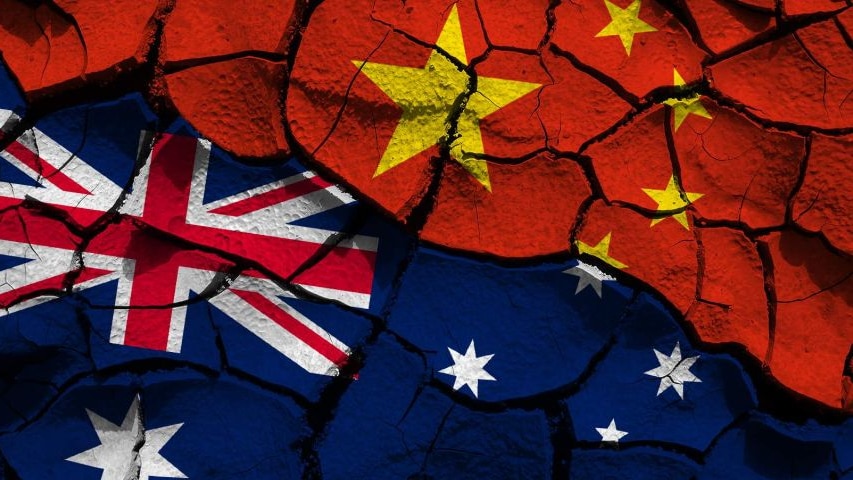Chinese trade war tariffs drive wine exports off cliff, but new markets emerge
ABC Rural
/ By
Sarina Locke and
Cassandra Hough
Posted 3h ago3 hours ago, updated 1h ago1 hours ago
Australian wine exports to China fell by 77 per cent but exports to Hong Kong rose by 137 per cent in the past 12 months.(ABC South East SA: Bec Whetham)
Help keep family & friends informed by sharing this article
abc.net.au/news/australian-wine-exports-decline-as-chinese-tariffs-hit-home/100549710
COPY LINKSHARE
Australian wine exports have dropped to their lowest point in five years due to the Chinese government's tariffs, but Hong Kong's door is wide open.
Key points:
- Wine exports decreased by 24 per cent in the year to September 30 as the effect of China's tariffs starts to show
- The UK market continues to show strength following the pending signing of the Australia/UK free trade agreement, rising by seven per cent
- There was 28 per cent growth in exports-per-litre for wine priced above $200, showing promise for Australia's premium offerings
The latest Wine Australia report found demand for Australian wine lifted by 135 per cent in Hong Kong and 43 per cent in South-East Asia, apparently showing that Australian winemakers are diversifying away from their former premium market.
Wine Australia's Corporate Affairs and Regulation general manager Rachel Triggs said the figures did not necessarily mean Australian wine was getting into China via Hong Kong.
"We don't have visibility over where wine is shipped beyond where it's destined after it leaves Australia," she said.
"I certainly wouldn't speculate that's what's driving the numbers to Hong Kong.
"If you look at the data pre-China Australia Free Trade Agreement, before the tariff in China was eliminated, there were fairly similar figures.
"So it is likely there was a lot of stock that was going into China when it was tariff-free and that could have included Hong Kong."
Wine exports to mainland China fell by 77 per cent in the past 12 months.(Supplied: Wine Australia)
Rise and fall
In the year to September 2021, wine exports to China fell by 77 per cent to $274 million, down from the previous average of $1 billion a year.
It has lowered the overall wine export figure by 24 per cent to a total of $2.27b.
By volume, wine exports declined by 17 per cent to 638 million litres, according to the latest wine export report.
Wine tariffs expected

Reports confirm China will extend "anti-dumping measures", banishing Australian exporters for the long term.
Read more
The shock was exacerbated in March when China announced it would
extend the tariffs of almost 220 per cent for the next five years.
Australia, affected by droughts and fires between 2018 and 2020, also had less wine to sell over the past year.
The large 2021 crush will be bottled and ready for exporting over the next six months.
Wine exports to China peaked just before the tariffs were introduced 12 months ago before falling off a cliff.
Ms Triggs said the decline was "amplified" by an increase in exports in September and October last year that was driven by heightened activity brought on by the impending imposition of Chinese tariffs and the United Kingdom's Brexit transition.
She said there was also heightened demand for Australian wine in the UK and the United States during the pandemic.
South-East Asia was the fastest-growing market for Australian wine, up 43 per cent, between October '20 and September 21.(ABC South East SA: Bec Whetham)
Finding new markets
The greatest growth came from shipments to South-East Asia, up 43 per cent to $255m, followed by Europe, including the UK, which rose by four per cent to $703m.
It was a small section of the market but remarkably the most expensive wines – priced above $200 per litre – had increased sales.
Wine markets diversify following China tariffs

With a WTO decision on Chinese wine tariffs expected to take years, Australian producers are cracking into new markets.
Read more
Demand fell for all other, cheaper categories.
Americans, meanwhile, were looking for Australian wine at the affordable end — those priced in the $10-$30 range increased by 16 per cent.
Ms Triggs said it was good to see that growth
"This is key to ensuring Australian wine's continued success in the US market," she said.
"The premium price segments are driving growth of the broader wine category in the US."
Australian wine exporters are looking further afield, but competition at home is stiff.(ABC South East SA: Bec Whetham)
Diversifying models
Ms Triggs said Australian exporters were continuing to "diversify their business models" and get product to a "broad range of markets".
An increasing number of exporters chose to ship to the US, which she said was the "highest number of exporters since the Global Financial Crisis in 2009".
The domestic market, however, remains the most significant market for Australian winemakers.
Hunter Valley winemaker Stuart Hordern, from Brokenwood, said exports made up 15 per cent of his sales.
His exports to China have dried up, but he says he is seeing good growth in the US and UK off a small base.
China dream 'over'

After 12 months of the trade war, Australian farmers and miners are warned that relations with China may not normalise — but many have already started to find success in new markets.
Read more
But the loss of the Chinese market is having a big impact in terms of domestic competition.
Mr Hordern said he had lost money due to the New South Wales lockdown.
"Retail has been healthy over the last 12-18 months during lockdown, as people have been at home," he said.
"Online sales have been good, but obviously cellar door visits have been non-existent — trade through restaurants and bars have taken an enormous hit."
Mr Hordern has focussed on building online sales and selling through email networks.
He has managed to hang onto his staff and is looking forward to opening up again.
